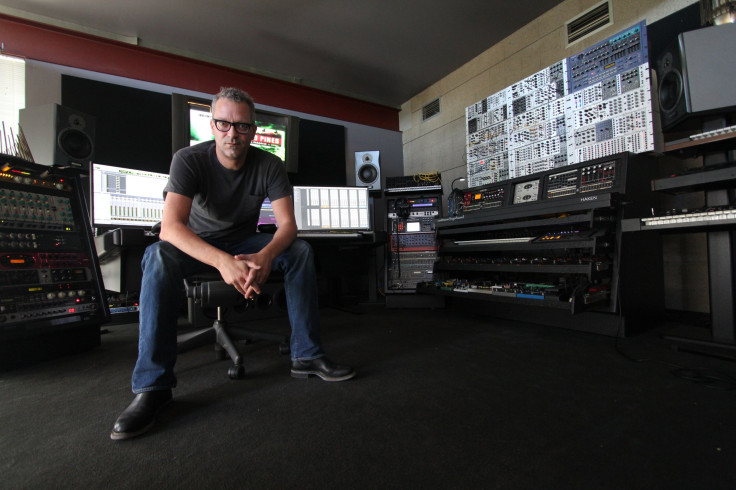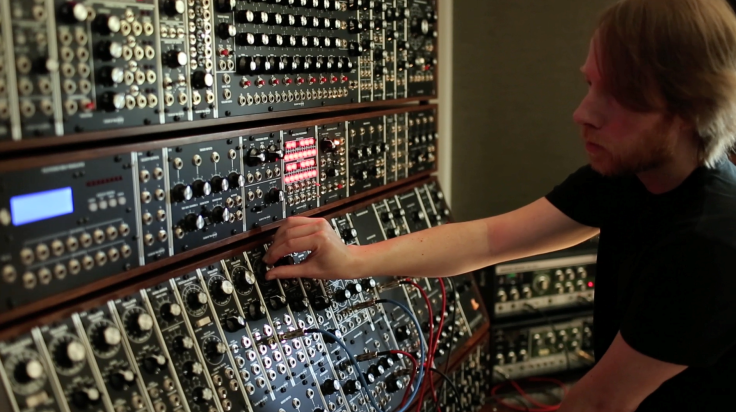If composer Charlie Clouser does one thing very well, it’s teleporting through space and time to freak you the fuck out. As an ex-member of Nine Inch Nails, Clouser has a pedigree for composing the kind of overtones that haunt across your nightmares. He knows how to engineer sounds to bring emotion to the pictures that flicker on a screen. Clouser’s preferred media are television and film and, although he’s worked with video games, he admits he doesn’t have a taste for it.
Bill Brown, however, is a composer who cut his teeth writing music for triple A game franchises such as Rainbow Six, Wolfenstein and Tom Clancy’s Ghost Recon. Brown, like Clouser, understands how to use atmosphere to communicate emotion.
Both composers recently worked with SyFy to produce the scoring for some of the original programming making up the vanguard of the channel’s new content heavy direction. Clouser is behind the score for Childhood's End (SyFy), a new mini-series that premiered on Dec. 14, 2015. Based on Arthur C. Clarke’s 1953 novel, Childhood End’s musical gusto captures the sinking feeling the human spirit experiences when it’s forced into utopia.
“In a lot of the work I did for 15 or 20 years making records, I developed techniques for sound design and manipulation in computers and effect units that lend themselves really well to horror,” said Clouser. “With science fiction, it’s a little less about crazy sound design and more about capturing the correct kind of melodic and chord change structure that will mesh with the storyline.”

Clouser’s past scoring, which includes creating the theme song for American Horror Story and the scores for the Saw series, has been about creating an atmosphere of fear and jumpy fright. But composing the perfect companion to the unspoken-creeping-feeling theme for Childhood’s End was a different kind of work.
“Often I find that new and fresh and unheard of sounds come from these weird acoustic devices and these strange metal rods that I play with violin bows, that give me something I’ve never heard before,” Clouser said. “I can’t rely on a lot of the tricks and techniques I can use in horror movies that I built up over the years working on dark and intense sounding records.”
Much like how composing for horror vs. science fiction differs, Clouser said the process for scoring video games is different than film and TV. In 2010, Clouser wrote the score for Singularity, a FPS developed by Raven Software and published by Activision.
Clouser feels timing is key to composition, and the challenge of video games is composing a score in advance for actions that haven’t occurred. Comparatively, film and TV are similar in the regard that they allow a composer to get “really specific picture to picture,” said Brown. He wrote the score behind season two of Dominion (SyFy) and is currently composing the score for a new Chinese MMORPG still in development.
“The important thing to remember with scoring games is that players are steering it, and they might live with the music for longer periods of time as compared to film or television,” Brown told iDigitalTimes. “So you have to create a score that will work for each different scenario in the game reactively, from experiencing the atmosphere and mood of a level to full-on action.”
Brown started his career by creating the demos for Tom Clancy’s Rainbow Six and Trespasser: The Lost World. After both demos were accepted, Brown worked with directors to make the music for commercials, TV shows and films before eventually spending nine years scoring CSI:NY (CBS).
“I've always believed the music has to have a soul regardless,” said Brown. “It needs to be connected thematically and texturally. It needs to support the action and connect with the audience emotionally, adding another layer to the overall experience [that takes] it to the next level.”
Brown works with post-production teams hand-in-hand to develop the first steps in meshing music and sound with thematic material. Having this set of themes to work around allows Brown the ability to use a couple key scenes as the inspiration to write, record and mix a score, sometimes in a matter of four to five days for shows such as CSI:NY .
“I love to try out new instruments and experiment with new technology, or sit down at the piano and just let my imagination run wild. The best ideas and themes tend to happen in the mind first for me,” Brown said. “With films or games it’s similar process, usually with longer schedules depending on the project. It’s always about the quality of the music and how it elevates the project first.”
When he first begins a project, Clouser said he creates a group of sounds independent to any score he may have worked on before. This allows him to make sure his compositions are unique, with each project having its own grab bag of sounds and influences that weave their own common motif throughout a story.
“[They are] often very time consuming to make, so I’ll sit and create these sounds without worrying about how I’m going to use them, or if I’m going to use them,” Clouser said. “After I got that stuff piled into the corner, then I sit down to start writing the music and have those new sounds to inspire me as the score develops. That, a lot of times, is one way to make sure each thing is different, because it’s the first time I’ve been able to use that set of sounds.”
Clouser wound up with a “pretty wild collection” of electronic instruments, effect units and even “strange acoustic instruments” over the course of his career, such as sculpture-like metal devices that can be played with mallets. Clouser said he typically spends anywhere from a week to a month when starting a new project just making sounds , whether it be on those acoustic instruments or processing electric guitar chords through effect units and other synthesizers.
Here's a bit of gear talk, with some more photos, on SonicScoop...https://t.co/prNsgwotos
— Charlie Clouser (@CharlieClouser) November 10, 2015
Being a composer means listening to composers, too. Clouser points to Harry Gregson-Williams of The Martian, who has a “great mix of orchestral stuff and really tasty electronic,” and Reinhold Heil of Cloud Atlas, who is “very minimalist but very tasty, and sort of intense without being big.”
For Brown, “I remember reading Hindemith scores and marveling at the simplicity of them, they sounded [so huge] on the stage,” he said. Much like Clouser, Brown draws from a unique source of inspiration for each project. Brown became bewitched with 20th century composers such as Hindemith, Vaughan Williams, Ravel, Bartok and Satie while studying at the Berklee College of Music in Boston, not to mention industry colossuses such as Williams, Barry, Goldsmith and Herrmann.
“I studied Howard Shore while I was composing mostly for games because I loved how evolved and elegant each of his scores were, how they really got underneath the narrative, elevated it and transported me, ” Brown said. “I loved how Trent Reznor’s edgy analog sounds felt against picture, so I delved deeply into that world in my studio [as well].”
Clouser on the other hand grew up listening to bands such as Killing Joke or Cabaret Voltaire.
“I draw a lot of inspiration from early industrial and post-punk kind of bands,” said Clouser. “In the late 80s and early 90s there was a lot of great experimentation with heavy sounds with some of those industrial bands. A lot of those textures translate well into really violent movies.”
Clouser has always gravitated toward more atmospheric and dark things, whether it be Pink Floyd or Brian Eno. The type of music that can make you feel something psychologically. These influences can be seen in Clouser’s Nine Inch Nails writing credits, which include The Way Out Is Through and Starfuckers, Inc.
After touring together in 1995 #DavidBowie painted a portrait of each of us. A kind gesture from a supreme talent. pic.twitter.com/muY9YW23P0
— Charlie Clouser (@CharlieClouser) January 18, 2016
Brown and Clouser know how to use our emotions against us in the pursuit of storytelling. Sound gives modern media this hidden power and they wield it well. You can’t picture Jaws without the “dun, dunnn.” You can’t picture Star Wars without that opening salvo of brass. Composers like Clouser and Brown aspire to make every moment a memorable one, even if it means we won’t remember they did anything at all.

















